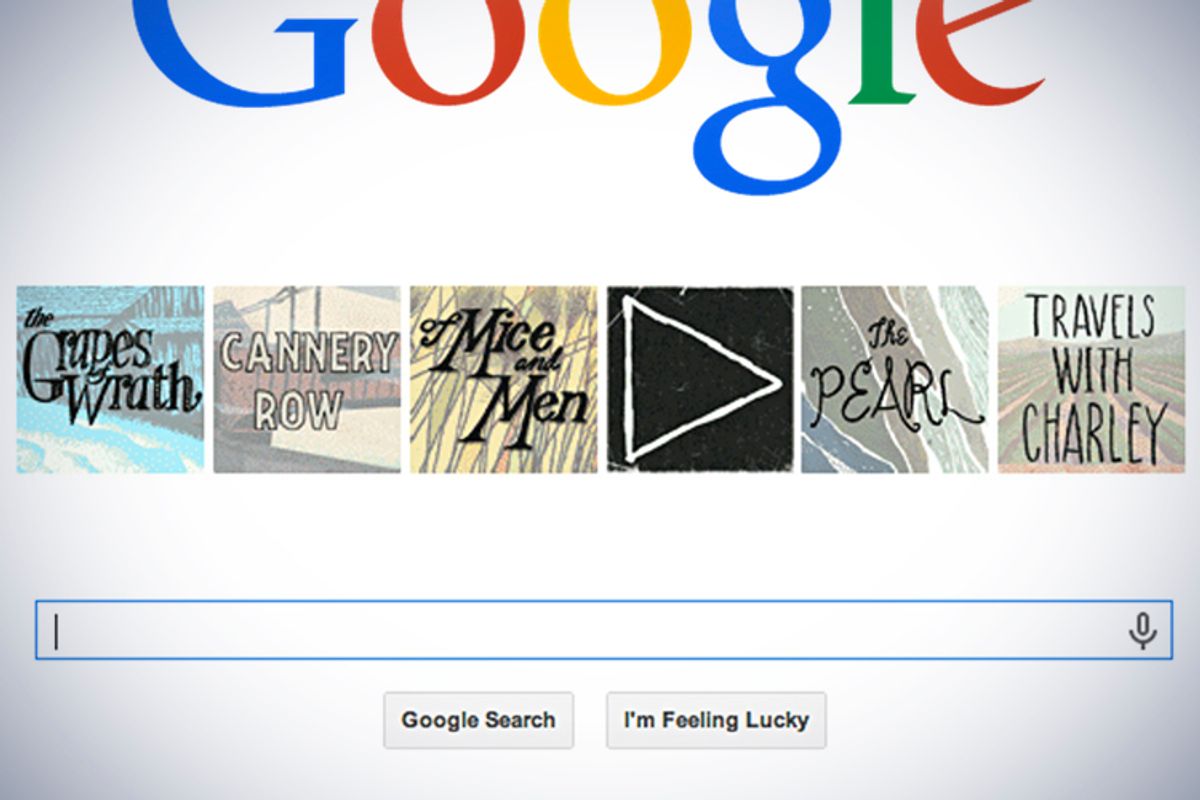Over the past 16 years Google Doodles -- delightful illustrations that appear on Google's homepage to acknowledge dates, people or innovations -- have increased in frequency and complexity. They include interactive games, animation and even a Valentine's Day collaboration with This American Life. What you may not have noticed is that a startling majority of these illustrations look similar to the demographic of tech companies like Google: male, and white.
SPARK, an organization aimed at empowering girls, dug through the archives to determine just how many doodles honored women and people of color. They looked only at illustrations that honored a person's accomplishments -- not holidays named after historical figures, cartoons, or the gender of animals. SPARK's data focuses in on the years 2010 - 2013, and tallies up both global doodles that appear worldwide and illustrations that only show up by region.
Their findings? "Google Doodles have been celebrating historical individuals since 2001, and while the designs have come a long way, the white male-centric focus really hasn’t," the report stated. Specifically out of 445 total Google Doodles, over four years, only 77 were female, a startling 17.3%. A pathetic 4.3% were women of color. Out of 89 global Google Doodles, 74 were men and there were only eight people of color (two of which were women).
The women at SPARK were not the only ones to notice the lack of women represented by Google's illustrated logo. Science educator Ann M. Martin has been tracking Google Doodles since 2011 at her blog Speaking Up. Along with following the statistics of representation, Martin highlights "Doodle-worthy women" that the company could have honored.
For those pooh-poohing, "It's just a Google Doodle! Why does that even matter?" The answer is simple: If people don't see themselves represented or celebrated for accomplishments they're less likely to think they can succeed in those fields. Ann M. Martin put it best. In an open letter on her blog she wrote:
For years, I have watched Google Doodles contribute to the viewpoint that it is men who create the world we live in and innovate to improve it. I continued to hope that Google would recognize and address this obvious bias. Because you have not spoken up for the women in STEM, creativity, innovation, the arts, and the humanities, I am speaking up for us.
Take the tech world. In the New York Times article, "Out of the Loop in Silicon Valley," Sapna Cheryan an assistant professor of psychology at the University of Washington said, "There’s a really strong image of what a computer scientist is — male, skinny, no social life, eats junk food, plays video games, likes science fiction. It makes it hard for people who don’t fit that image to think of it as an option for them." In late 2013 Tracy Chou a software engineer at Pinterest compiled the data of 84 tech companies in a public Google spreadsheet and found that only 12.33% of the engineers were women.
At November's Women 2.0, Google vice president Megan Smith spoke on a wide-range of topics, including "visibility" as a way to get more women more involved. She also highlighted a need to uncover the "lost history" of female pioneers in the sciences -- including Katherine Johnson who worked on many space flight missions, including Apollo 11, calculating the craft's trajectory. Prior to SPARK releasing its findings, Smith said Google was trying to feature more women in doodles, such as Ada Lovelace who appeared on December 10 of 2012. According to TechCrunch, Megan Smith also said she wants to make Google the "best company for women and minorities" including "gays, lesbians, different races, different walks of life." Hopefully we'll see this inclusion, and diversified doodles.
Thus far 2014 has seen women across many fields represented. In February 50% of those honored with doodles were women including Harriet Tubman and Clara Campoamor. Keep it up Google. From a business point of view, if you're going to use illustrations to seduce us into using your search engine, it helps to represent half of the population. And who knows, a Google Doodle could inspire the next great woman in tech.



Shares